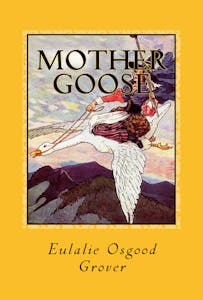Children, as well as their interested parents, will eagerly welcome this beautiful edition of the one great nursery classic, just as a worthy edition of Shakespeare is welcomed by discriminating adult readers.
But some may ask what there is in these simple melodies, attributed to Mother Goose, which gives them so secure and beloved a place in the home, the school and the public library. Is it the humor, the action, the rhythm, or the mystery of the theme which appeals so strongly to critical little minds in each generation of childhood, and even to adult minds so fortunate as to have retained some of the refreshing naiveté of early years?
It is useless to try to explain the charm of these nonsense melodies. The children themselves do not know why they love them. No mother can tell us the magic of the spell which seems to be cast over her restless baby as she croons to it a Mother Goose lullaby. No primary teacher quite understands why the mere repetition or singing of a Mother Goose jingle will transform her listless, inattentive class into one all eagerness and attention. But mother and teacher agree that the best of these verses have an even more potent influence than that of innocently diverting and entertaining the child. The healthy moral, so subtly suggested in many of the rhymes, is unconsciously absorbed by the child's receptive mind, helping him to make his own distinction between right and wrong, bravery and cowardice, generosity and selfishness.
From a literary standpoint, also, these rhymes have proved of real value in creating a taste for the truly musical in poetry and song. They train the ear and stir the imagination of the child as no other verses do. Many famous poets and writers trace their first inspiration, and love for things literary, back to the nursery songs and fairy tales of their childhood.
Teachers well know that children who have reveled in these rhymes and stories, at the time of their strongest appeal, step naturally and appreciatively into the great fields of good literature which are beyond.
Knowing these things to be true, we do not hesitate to place this venerable classic on the shelf beside our Shakespeare, and to send our children there for delight and inspiration. They will understand Shakespeare the better for having known and loved Mother Goose.
But what about the personality of this classic writer? Was she really Mistress Elizabeth Goose who is said to have lived in Boston about two hundred years ago, and who crooned her nonsense jingles to a large and happy family of grandchildren? We are told that their father, Thomas Fleet, who was a printer by trade, thought to turn an honest penny with his mother-in-law's popular verses, so he published them in a small volume under the title of "Songs for the Nursery: or, Mother Goose's Melodies." A goose with a very long neck and a wide-open mouth flew across the title page, at least so the story goes. But we have to believe that it is only a story, for no copy of the book can be found, and nothing but tradition identifies Elizabeth Goose, the Boston grandmother, with the famous rhymester.
